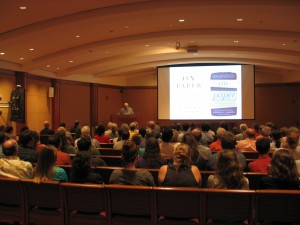Rare Book School Day 1
 A beautiful start to the week—here’s a picture of what I THOUGHT was Monticello (but is not) atop its mountain, which is visible from the steps of the Alderman Library…still an inspiring sight as we walk into our first full day of class.
A beautiful start to the week—here’s a picture of what I THOUGHT was Monticello (but is not) atop its mountain, which is visible from the steps of the Alderman Library…still an inspiring sight as we walk into our first full day of class.
How does a book make its meaning? All books have intentions on imagined readers, and we can reconstruct many of those intentions from the physical copies left to us.
We began the discussion with samples of Harlequin romance novels, which was delightful to me because I have always been fascinated by the romance genre. It is the most effectively marketed genre in the history of American publishing, to my mind, in great part because it knows its own market with a greater intimacy than say, the publishers of mystery novels or of science fiction (although online marketing and publishing is changing that). The key benefit to my own teaching is that modern books are so much more accessible to undergraduates as a starting point in terms of discussing what sorts of meaning we can decode from physical copies. I am pretty sure the same sort of exercise could be done with young adult novels, with which my students will have more experience.
 Starting with what students know, or can easily access, and leading them to apply the same sort of observational analysis to older books, like this giant, gorgeous antiphonal, was the core take-away for me today. That, and the idea of showing books in pairs, to allow the students to “read” one against the other, comparing and contrasting their elements and conjecturing why they are different or similar, rather than asking them to guess at the significance of the aspects of just one book. This was demonstrated to great effect when we were shown a truly exquisite Paris Bible and an even more impressive miniature manuscript Bible.
Starting with what students know, or can easily access, and leading them to apply the same sort of observational analysis to older books, like this giant, gorgeous antiphonal, was the core take-away for me today. That, and the idea of showing books in pairs, to allow the students to “read” one against the other, comparing and contrasting their elements and conjecturing why they are different or similar, rather than asking them to guess at the significance of the aspects of just one book. This was demonstrated to great effect when we were shown a truly exquisite Paris Bible and an even more impressive miniature manuscript Bible.

 The composition of the class is a nice mix of 7 librarians, 6 academics, one book designer, and one rare book dealer. The conversations and questions have been excellent, and we seem to be learning a great deal from each other–working through issues both practical and theoretical.
The composition of the class is a nice mix of 7 librarians, 6 academics, one book designer, and one rare book dealer. The conversations and questions have been excellent, and we seem to be learning a great deal from each other–working through issues both practical and theoretical.
Lunch for my little group brought almost no book-talk–we discussed parenting! But it was a welcome relief from the intense focus of class, and we went back re-energized. The connections we are forging with each other cannot rest on bibliophilia alone, after all–we don’t live or work in a vacuum.
 The evening talk by Nick Basbanes was well-attended, not only by RBS students, but from the community and parts beyond (apparently one devoted fan drove all the way from Pittsburgh to see him and to get a few books signed!). It was humbling to see pictures from his travels in China, where paper was invented, and to know that one family who has been making paper for 600 years has had to close because the children have no interest in continuing the work. At the culmination of his talk, quite a few of us could not escape dry-eyed from a moving story that involved paper in the wake of the 9/11 tragedy (I will not divulge it here–read the book).
The evening talk by Nick Basbanes was well-attended, not only by RBS students, but from the community and parts beyond (apparently one devoted fan drove all the way from Pittsburgh to see him and to get a few books signed!). It was humbling to see pictures from his travels in China, where paper was invented, and to know that one family who has been making paper for 600 years has had to close because the children have no interest in continuing the work. At the culmination of his talk, quite a few of us could not escape dry-eyed from a moving story that involved paper in the wake of the 9/11 tragedy (I will not divulge it here–read the book).
Tomorrow promises new epiphanies and ideas for my teaching, meeting new potential collaborators/allies/connections, and more excellent food!